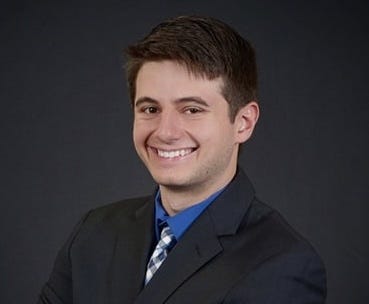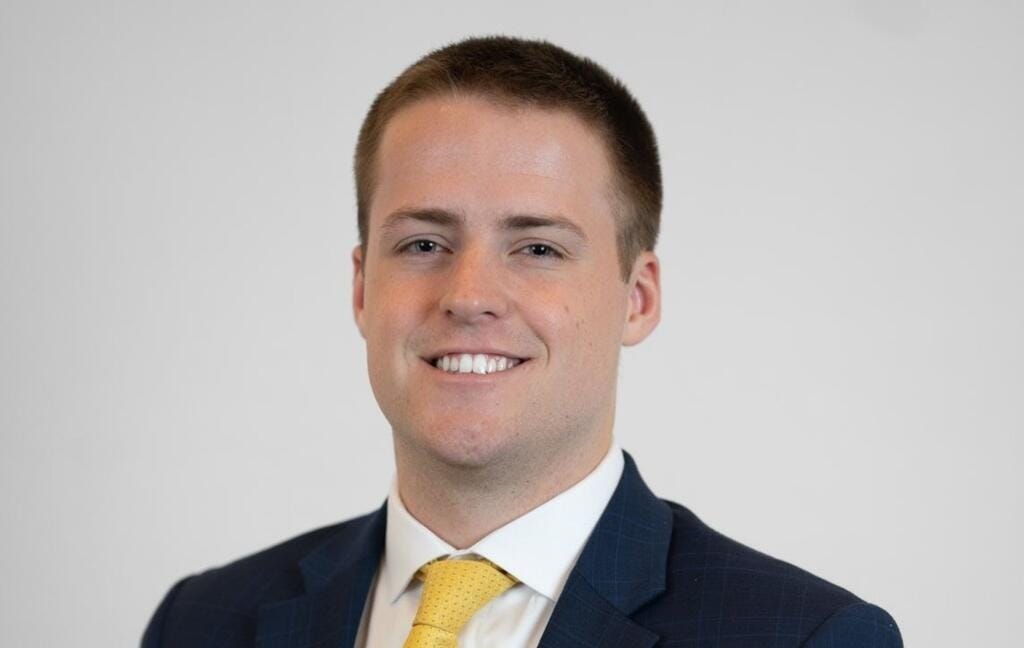Gen C
Young Freedom Conservatives help to build new audiences and institutions
Among the hundreds of signatories to the Freedom Conservatism Statement of Principles are longtime commentators, chief executives, and former elected officials who’ve spent decades building key institutions of American conservatism or turning its principles into policy at the local, state, or federal levels.
Their names are instantly recognizable. Freedom Conservatism benefits greatly from their prominence and experience.
But the success of our movement — which champions the principles of the American Founding against its critics from both the Progressive Left and the Populist Right — also depends on the vitality and creativity we draw from our Millennial and Zoomer signatories.
Today we spotlight early- and mid-career FreeCons working at the cutting edge of public policy, public discourse, and politics.
Straight line
Kimberly Ross is a contributor to the Washington Examiner‘s Beltway Confidential blog, a regular columnist for the Examiner and the Magnolia Tribune, and a FreeCon signatory.
Ross has also written for Arc Digital, USA Today, and The Bulwark, among other outlets.
In a recent Examiner column, she described the “straight line” that led from Luigi Mangione, the accused killer of insurance executive Brian Thompson, to Tyler Robinson, the accused killer of conservative activist Charlie Kirk.
“There is nothing but delusion and hubris behind these incidents of political violence,” she wrote. “A delusion that says one’s anger gives permission to commit the most heinous act against another human being. And the hubris to believe that by doing so, you’re either righting a wrong, can’t or shouldn’t be held accountable, or are making a change.”
“Both Luigi Mangione and Charlie Kirk, young men with their lives ahead of them, made a change,” she continued. “Mangione, a coward, selected violence as his route to infamy. Meanwhile, Kirk chose politics and dialogue. As his footprint grew larger, it became about having respectful conversations with other human beings about difficult subjects in a public setting.”
“For all the criticism launched his way, Charlie Kirk did what Luigi Mangione could not: acknowledge the unique worth of other human beings.”
Divergent views
Charles Hilu is a reporter at The Dispatch, a former Collegiate Network Fellow at the Washington Free Beacon, and a FreeCon signatory.
A graduate of the University of Michigan, Hilu was editor of its conservative newspaper, a student reporter for The College Fix, and an intern at both National Review and the Washington Examiner.
In a recent Dispatch piece on the competitive U.S. Senate race in Michigan, he observed that a bruising Democratic primary could hurt the winner’s general-election chances against presumptive Republican nominee Mike Rogers.
Rep. Haley Stevens, a member of the center-left New Democratic Coalition, faces state Sen. Mallory McMorrow and physician Abdul El-Sayed, the latter winning the endorsement of Sen. Bernie Sanders and tying himself to Zohran Mamdani, the Democratic nominee for mayor of New York City.
“Although domestic issues are likely to dominate the general election,” Hilu wrote, the three Democrats have “especially divergent views on American aid to Israel, as they run in a state where over 100,000 Democratic presidential primary voters — largely part of the state’s significant Muslim and Arab-American population — chose ‘uncommitted’ on the ballot in a rebuke to President Joe Biden’s support for the country in its war against Hamas in Gaza.”
Stevens largely supports Israel, McMorrow opposes the export of “offensive” weapons to the country, and El-Sayed describes Israel’s action as “genocide.”
Defining legacy
Justin Stapley is a graduate student at Utah Valley University, co-founder and state director of the Utah Reagan Caucus, and a FreeCon signatory.
In a recent Deseret News piece, Stapley urged readers of all political persuasions to unite behind the principle of free speech.
“Charlie Kirk was a National Conservative,” he wrote. “I am a Freedom Conservative. While both right-wing activists, we nevertheless shared deep disagreements over the vision and direction for the conservative movement and the Republican Party.”
“But such cursory distractions no longer matter. In the wake of the vicious evil of an assassin’s bullet at my own home campus of Utah Valley University, Charlie Kirk stopped being my political opponent. He became a martyr. And that’s how I will choose to remember him.”
After chronicling Kirk’s shifting views on some issues, Stapley observed that “he remained a determined and consistent champion of open inquiry in higher education, a staunch defender of freedom of speech on the college campus, and an advocate for an innovative heterodox rather than a stifling orthodox culture in academia.”
“And the place and manner of his death punctuate these things as his defining legacy.”
Polarizing topic
Tanner Nau is an editorial fellow in the Washington bureau of The Free Press and FreeCon signatory.
A former College Fix fellow at the Washington Free Beacon, he also interned at the John Locke Foundation and in the office of U.S. Rep. Patrick McHenry.
In a recent Free Beacon review of Daniel J. Flynn’s The Man Who Invented Conservatism: The Unlikely Life of Frank S. Meyer, Nau noted that Meyer “did not live to see the Reagan Revolution march through the White House. But his fusionist conservatism did.”
“Centered on the sanctity of the individual, an ever-present tension between freedom and virtue, and an opposition to collectivism of all stripes, fusionism garnered support from both libertarian and traditionalist factions of the American Right.”
“High-minded conservatives have been mulling over Meyer's intellectual legacy of fusionism ever since,” Nau added. “It's likely to continue to be a polarizing topic, especially with the rise of a ‘New Right’ looking to reinvestigate and relitigate core beliefs of the American Right.”
In the mix
• In the Magnolia Tribune, FreeCon signatory Russ Latino related incidents of educators, activists, and others going on social media to celebrate the murder of Charlie Kirk.
“This trend of dehumanizing people who think differently than us is disturbing,” wrote Latino, an attorney who founded of the Tribune and hosts “The Sit Down” at Mississippi Public Broadcasting.
But when Attorney General Pam Bondi described such messages as “hate speech” subject to prosecution, she invented an illusory exception to the U.S. Constitution, Latino argued.
“Woe to the people incapable of pondering how bad this kind of government intervention in speech could get and also who can’t contemplate how their political enemies might use that newfound power against them. People who agree with Bondi won’t always be in power. Today, the government prosecutes Kirk haters. Tomorrow, it prosecutes pastors for preaching traditional marriage.”
• In Civitas Outlook, FreeCon signatory Thomas D. Howes praised the leadership of Utah Gov. Spencer Cox over the course of the Charlie Kirk story.
“In this age of resentment politics, he may as well have been Pericles, telling his audience not necessarily what they wanted to hear but what they needed to hear at that moment,” wrote Howes, a lecturer at Princeton University.
“Breaking through the lie that it was they, the Left, and thus millions of our fellow Americans, who killed Charlie Kirk, Governor Cox, in his press conferences, provided what he called ‘moral clarity’ — that ‘words are not violence,’ that ‘violence is violence,’ and that ‘there is one person responsible for what happened here. And that person is now in custody.’”
• At The Dispatch, FreeCon signatory Jonathan Adler argued that the U.S. Supreme Court is “doing its job” by countering executive overreach without abandoning its proper judicial role.
“The primary reason for the Trump administration’s remarkable success rate in seeking emergency relief from the Supreme Court,” wrote Adler, the Tazewell Taylor professor of law at the William & Mary Law School, “is that it has been very selective, focusing on cases in which lower courts have exceeded their jurisdiction, prematurely enjoined the administration from taking lawful actions, or otherwise offered relief that was not called for under existing law.”
“And quite tellingly, the Trump administration has not sought high court relief in cases in which its actions would be most difficult to defend, such as its lawless, petty, and vindictive attacks on law firms that have represented Trump critics and other political opponents.”
• In The Hill, FreeCon signatory Alex Salter rebutted the notion that artificial intelligence will destroy undergraduate programs in business education.
“The doomsayers fall for the ‘lump of labor’ fallacy — the notion that there’s only so much work to go around, so if AI does more of it, workers must do less,” wrote Salter, a Texas Tech professor, and his coauthor Bryan Cutsinger.
“Economics teaches the opposite. Because our wants are unlimited, there is no fixed number of jobs. When new technologies make goods and services cheaper, they expand demand — and with it, employment.”
“Far from eliminating work, AI will fuel the creation of new jobs to satisfy our endless wants. For students, the challenge is not whether to study business, but how. The winners will be those who embrace AI as a tool rather than fear it as a rival.”




